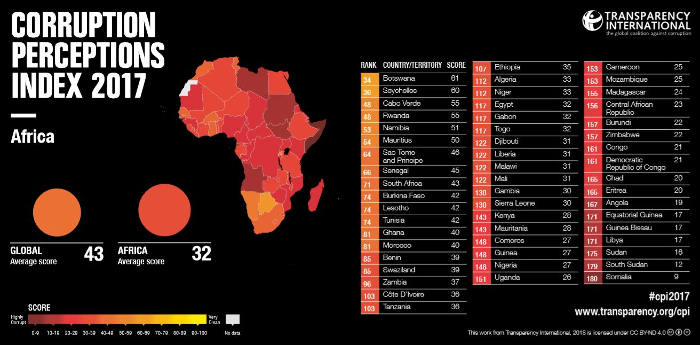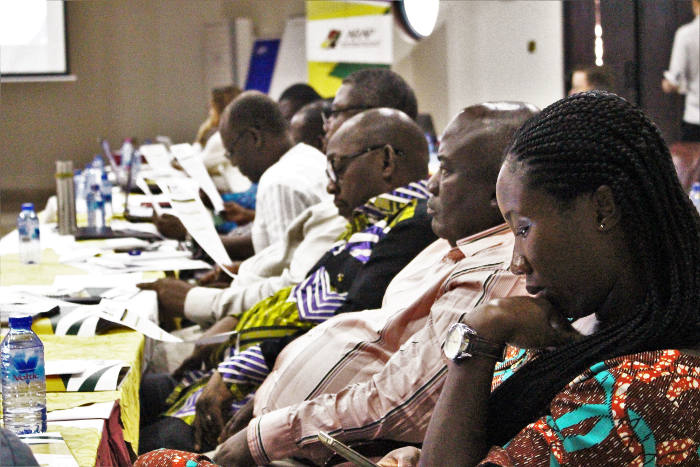-
|
13 April 2018
|Posteado en : Reportage
The Ghana-ARAP Project relies on institutions to get the public involved. According to Transparency International, sub-Saharan Africa is the worst–rated region in this respect
“Having to pay for a service we have a right to receive – do you think that is corruption?” Barbara Mensah asks the people of Ghana, referring to one of the most burning questions of our time. She is one of the Civic Education Officers responsable for investigating perceptions of corruption in Ghana.
“I am going to ask about certain practices, you tell me if you think they are corrupt” was the question put by another of these officers, Jafaru Omar. Through a questionnaire, officers appointed by Ghana’s National Commission for Civic Eduction (NCCE) survey the views of citizens in different parts of the country.
On the ground, the findings are already clear: of the 8672 responses, over half those surveyed (58.4%) have been witnesses to some form of corruption. Henrrieta Assante-Sharpong, in charge of the investigation, says: “the findings show that although Ghanaians are aware of corruption, they have very little knowledge of the various ways it may be practised.”
The NCCE was set up for the purpose of increasing public awareness: “Our lives are going backwards. We don’t have roads, there is no electricity. The money gained from corruption could have been used for these services”, says Aluliga Malpang, a farmer from the Tengzuk Community. Sub-Saharan Africa is the worst-rated region for corruption, according to the most recent report from Transparency International.
Cooperation in a hostile climate
The report on the Corruption Perceptions Index (CPI) rates 180 countries and territories according to perceived levels of corruption in the public sector, using a scale of zero to 100, where zero is extremely corrupt and 100 highly transparent.
New Zealand and Denmark are highest-placed in 2017, with scores of 89 and 88 respectively. Syria, South Sudan and Somalia have the lowest scores, with 14, 12 and 9 respectively. Ghana is in 81st place, with 40 points – a score above the average for the sub-Saharan region (32 points).

Nevertheless, the study shows that over two-thirds of countries had scores below 50. Transparency International works internationally and locally in over 100 countries in the world: “giving a voice to the victims of corruption, working with governments, undertakings and citizens to stop the abuse of power or bribery”. It states that most countries are making little or no progress in putting an end to corruption.
Ghana does not want to be in that category. Its initiative is part of the Anti-Corruption, Rule of Law and Accountability” programme. It is a project in support of transparency, with the aim of reducing corruption and improving accountability in the African country. For four and a half years, FIIAPP has been managing this programme, financed by the European Union, in collaboration with GIZ (Germany) and the Organisation for Economic Cooperation and Development (OECD).
“I want to help solve the corruption problem”, said Joseph Samuel Bebefiankom, a student in Kwashieman (Accra). Like him, other citizens say “it could be reduced, cut back”, “that will provide jobs for a lot of people” “it will help the country to develop.” They know what they want to achieve, but not how to achieve it.
A number of Ghanaian public institutions such as the NCCE, in collaboration with FIIAPP, have designed a strategy to involve the public, as well as others, in the struggle against corruption. One of the priorities of Ghana-ARAP is to raise their awareness of the importance of reporting it.
The more leaders that get involved, the less corruption there will be
The África no es un país [‘Africa is not one country’] blog reminds us, in the same report, that “2017 has seen the fall of a number of rulers accused of encouraging corruption”: Yahya Jammeh in Gambia, José Eduardo dos Santos in Angola, Robert Mugabe in Zimbabwe and, already in 2018, Jacob Zuma of South Africa.
George Obeng Obei is another Civic Education Officer. He says “people without much education don’t know how things are done in assemblies and in institutions. But they do believe there are elements of corruption in them”, Not knowing how it works doesn’t mean they don’t see it. They know, they are aware, according to Obeng Obei, that you can only get things with money. And this mindset has to be changed.

ARAP Ghana workshop According to Transparency International, it is the right time to “redefine” the problem in Africa, as, in some cases, the CPI points to a “hopeful future” for the continent. In spite of being the worst region overall, some countries have made significant progress, such as Botswana (61), which has a higher rating than Spain (59).
The key, according to the organisation, is that these countries have “a political leader committed to fighting corruption.” That is why they go further in developing laws and institutions in this regard. Ghana is making efforts in this direction, and its government has introduced a National Anti-corruption Action Plan (NACAP) to steer the project.
If the public at large also gets involved, success will be one step closer. The president of the NCCE, Josephine Nkrumah, knows this. She assesses the investigation conducted in the country: “NCCE will use this report to create civic education actions. To win the battle, we have to get both the public and the private sector involved. And what is even more important is getting every Ghanaian man and woman involved.”
“Winning the fight against corruption” is the African Union (AU)’s motto for 2018. This phrase could be said to apply to almost the whole world. It stems from the premise that “corruption rewards those who disobey the rules, destroying all the endeavours of constructive, just and equitable governance”.
The areas investigated in Ghana are shown in this video:




